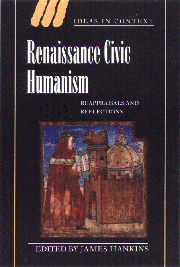Book contents
- Frontmatter
- Contents
- List of contributors
- Introduction
- 1 The republican idea
- 2 “Civic humanism” and medieval political thought
- 3 Civic humanism and Florentine politics
- 4 The two myths of civic humanism
- 5 Rhetoric, history, and ideology: the civic panegyrics of Leonardo Bruni
- 6 De-masking Renaissance republicanism
- 7 Civic humanism, realist constitutionalism, and Francesco Guicciardini's Discorso di Logrogno
- 8 Bruni and Machiavelli on civic humanism
- 9 Rhetoric, reason, and republic: republicanisms – ancient, medieval, and modern
- 10 Situating Machiavelli
- Index of manuscripts and archival documents
- General index
- Ideas in context
7 - Civic humanism, realist constitutionalism, and Francesco Guicciardini's Discorso di Logrogno
Published online by Cambridge University Press: 06 October 2009
- Frontmatter
- Contents
- List of contributors
- Introduction
- 1 The republican idea
- 2 “Civic humanism” and medieval political thought
- 3 Civic humanism and Florentine politics
- 4 The two myths of civic humanism
- 5 Rhetoric, history, and ideology: the civic panegyrics of Leonardo Bruni
- 6 De-masking Renaissance republicanism
- 7 Civic humanism, realist constitutionalism, and Francesco Guicciardini's Discorso di Logrogno
- 8 Bruni and Machiavelli on civic humanism
- 9 Rhetoric, reason, and republic: republicanisms – ancient, medieval, and modern
- 10 Situating Machiavelli
- Index of manuscripts and archival documents
- General index
- Ideas in context
Summary
Writing in the second decade of the sixteenth century, at the end of Florence's republican period, the historian and statesman Francesco Guicciardini gave systematic expression to a body of thought that had evolved out of the practice of Florentine oligarchic statesmen since the suppression of the Ciompi rebellion in 1378. In his early works such as the Discorso di Logrogno (1512) and the Florentine Histories (1508–9), but also in the more mature Dialogue on the Government of Florence (c. 1521–c. 1525), Guicciardini reflected upon and brought to a high degree of theoretical clarity this important strand of Florentine political opinion. Guicciardini's project was foreshadowed in the letters and hortatory writings of humanists like Leonardo Bruni, but it was rooted still more in the discussions and consultations on public matters that were a traditional part of Florentine political life. The records of such discussions disclose the attitudes behind the numerous efforts – some more successful than others – to change the legal, political, and institutional order of the city.
This tradition expressed the aspirations of a social class that sought to consolidate its predominance by setting itself apart as a formally recognized political class, uniquely entitled to the higher offices of the state. As such it was resisted by a popular opposition that appealed to traditional mores and claimed the authority of the hallowed medieval civic statutes.
- Type
- Chapter
- Information
- Renaissance Civic HumanismReappraisals and Reflections, pp. 200 - 222Publisher: Cambridge University PressPrint publication year: 2000
- 3
- Cited by

